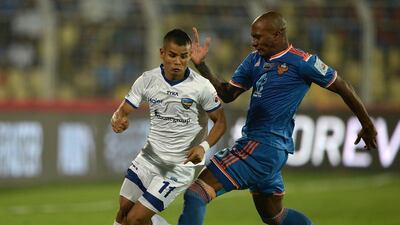The 2015 Indian Super League (ISL) final in December was a terrific advertisement for the fledgling competition.
FC Goa, playing in front of their home crowd at the Fatorda Stadium, and Chennaiyin FC were tied at 1-1 and facing the prospect of extra time.
That was when Jofre Gonzalez, who started his nomadic career with Barcelona in the late 1990s, sneaked a free kick through the wall to give Goa, coached by Zico – dead-ball star of the Brazilian sides of the late 1970s and early '80s – the lead with just three minutes left in normal time.
In the stands, Virat Kohli, the India Test captain, who has invested in the Goa franchise, clenched his fist and jumped up and down in anticipation of the trophy being won.
But with just seconds left of the 90 minutes, Chennaiyin launched a cross that Laxmikant Kattamani, the Goa keeper, could only punch into his own net. And within a minute on the restart, a long ball found Stiven Mendoza, the Colombian striker who finished as the ISL’s top scorer.
Eye on India part II: In partnering with Martina Hingis, Sania Mirza has again become a golden girl
He slipped past two defenders and calmly slotted the ball past Kattamani to give Chennaiyin the most improbable of title triumphs.
But Goa's misery was just beginning. They alleged that Elano Blumer, the Chennaiyin midfielder who played for Manchester City between 2007 and 2009, had assaulted one of their owners, Dattaraj Salgaocar, after the game. Elano was subsequently arrested and released, with video evidence suggesting that the Goa camp had been as culpable.
And it did not end there.
Goa officials alleged that the match had been fixed, and boycotted the post-match presentation and the league’s closing ceremony.
Five months on, they have paid a hefty price, with the ISL’s Regulatory Commission imposing draconian punishments.
Goa have been fined a total of 110 million Rupees (Dh6m), and Salgaocar (three years) and his fellow owner, Srinivas Dempo (two) have been given multiple-season bans.
They will not be allowed into the stadiums in any capacity.
Even worse, Goa will have to start the 2016 campaign with a 15-point penalty, which effectively rules them out of the play-offs with each team having only 14 games in the regular season.
Goa have said they will appeal the decisions, but in a league where teams are already coping with massive operational losses, there is the very real prospect that they will withdraw altogether.
For Goan football, which has fallen on hard times in recent years, it could be a body blow.
Companies run by Dempo and Salgaocar are prominent industrial houses in the small western Indian state, and the football teams that they bankroll, Dempo SC and Salgaocar FC, have been around for more than half a century.
Dempo have been national champions five times and Salgaocar twice, but both have endured horror runs over the past few seasons.
Salgaocar narrowly escaped relegation from the I-League – the official competition run by the All India Football Federation (AIFF) – while Dempo have just been promoted after a season in the second-division wilderness.
FC Goa, an amalgamation of two of Goan football’s power centres, was an attempt to make sure that the state stayed relevant in the more lucrative and privately run ISL.
Indian football cannot afford a crisis in Goa.
Traditionally, the state, along with Bengal, Kerala and Punjab, has provided the national side with many of their best players.
These days, there are no teams from Kerala or Punjab in the I-League.
The Sachin Tendulkar-owned Kerala Blasters, who reached the final in the inaugural season of ISL, finished rock bottom in 2015.
The ISL has attracted huge crowds, with more than 60,000 attending matches in Kolkata and Kochi, but this is the sort of publicity it did not need as franchises start to take a closer look at balance sheets that do not make for happy reading.
Indian football has been in a perennial state of crisis since the halcyon years in the 1950 and 1960s, but this latest sordid chapter could be one of the most damaging.
sports@thenational.ae
Follow us on Twitter @NatSportUAE
Like us on Facebook at facebook.com/TheNationalSport

